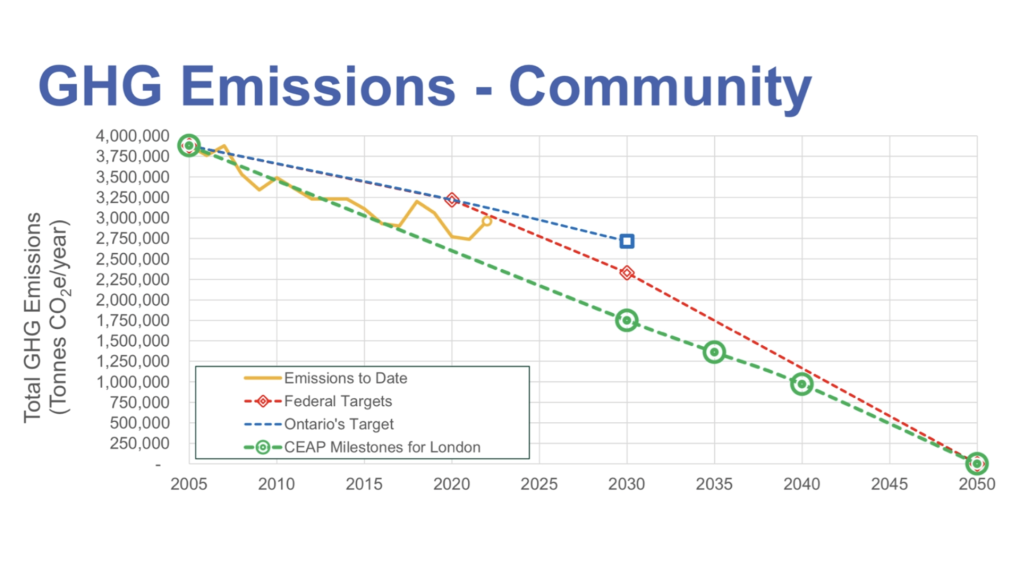Climate Emergency: Why did London, Ont. lose ground in its effort to reduce total greenhouse gas emissions?
One year into London, Ont.’s strategy to address climate change, total greenhouse gas emissions have moved in the wrong direction.
A first annual update to the Climate Emergency Action Plan (CEAP) admitted, “Emissions in 2022 were above the trend line needed to meet London’s new science-based targets, notably the 2030 target for a 55 per cent reduction from 2005 levels.”
Councillor Skylar Franke is urging colleagues to make a greater commitment to achieving the targets of London’s CEAP to ensure the community reaches the target of net-zero greenhouse gas emissions by 2050.
“Especially with the community emission reduction, we are not achieving the targets,” Franke told CTV News. “We are not on track for the 2030 targets, which are not very ambitious to begin with.”
In April 2019, city council formally declared a climate emergency.
By April 2022 the municipality launched the action plan, but Franke said the necessary financial investment wasn’t included.
“The previous council approved a plan with zero dollars to implement it and one new staff person in a corporation of 4,000 people!” she asserted.
The plan includes 200 individual actions, some simple and others complex.
 Historic GHG emissions and targets (Source: City of London)
Historic GHG emissions and targets (Source: City of London)
Director of Climate Change and Environment Jay Stanford said the first year established a foundation for future action, “For 2022 we have started 90% of the actions, many of those are city-driven many others are community-driven.”
Stanford pointed to several factors that contributed to the total greenhouse gas emissions last year, including the end of pandemic restrictions, population growth, and provincial decisions to generate more electricity from natural gas.
The report added that the local market share of SUV/pick-up trucks is higher, and Electric Vehicles (EV) is lower than the provincial and national averages.
“The results of those actions do take a couple years, so reporting out annually you were going to have these ups and downs,” Stanford added.
Also on the Strategic Priorities and Policy Committee agenda next week, Councillor Franke has requested that several environmentally themed business cases be developed for consideration during multi-year budget deliberations:
New Funding for Existing Strategies:
- Coves Silver Creek Restoration Project
- Invasive Species Management Plan
- Climate Emergency Action Plan
- Secure Bike Parking, Bike Share, Bike Lane Maintenance and Education
New Funding, New Strategies:
- Purchasing Natural Heritage Lands
Reduction Cases:
- Remove free two hour HONK promo code CORE street parking downtown
- Review road-widening projects in the current development charges study, to determine which can be deferred or eliminated
- Reduction in frequency of grass cutting on city property
“If we are serious about climate change, we need to be hiring a lot of staff people, and we actually had to effectively finance it,” said Franke.
The first-term councillor understands that the changes she’s proposing won’t be popular with everyone, but she says time to address climate change is running out.
Franke continued, “I’ve got a nine-month old, and I’m more concerned about him being able to go outside in August when he’s 30-years old and not experience heat stroke, than getting re-elected.”
The 2022 Climate Emergency Action Plan progress report will be considered at a committee meeting on May 30.
CTVNews.ca Top Stories

Widow looking for answers after Quebec man dies in Texas Ironman competition
The widow of a Quebec man who died competing in an Ironman competition is looking for answers.
Tom Mulcair: Park littered with trash after 'pilot project' is perfect symbol of Trudeau governance
Former NDP leader Tom Mulcair says that what's happening now in a trash-littered federal park in Quebec is a perfect metaphor for how the Trudeau government runs things.
World seeing near breakdown of international law amid wars in Gaza and Ukraine, Amnesty says
The world is seeing a near breakdown of international law amid flagrant rule-breaking in Gaza and Ukraine, multiplying armed conflicts, the rise of authoritarianism and huge rights violations in Sudan, Ethiopia and Myanmar, Amnesty International warned Wednesday as it published its annual report.
Photographer alleges he was forced to watch Megan Thee Stallion have sex and was unfairly fired
A photographer who worked for Megan Thee Stallion said in a lawsuit filed Tuesday that he was forced to watch her have sex, was unfairly fired soon after and was abused as her employee.
Amid concerns over 'collateral damage' Trudeau, Freeland defend capital gains tax change
Facing pushback from physicians and businesspeople over the coming increase to the capital gains inclusion rate, Prime Minister Justin Trudeau and his deputy Chrystia Freeland are standing by their plan to target Canada's highest earners.
U.S. Senate passes bill forcing TikTok's parent company to sell or face ban, sends to Biden for signature
The Senate passed legislation Tuesday that would force TikTok's China-based parent company to sell the social media platform under the threat of a ban, a contentious move by U.S. lawmakers that's expected to face legal challenges.
Wildfire southwest of Peace River spurs evacuation order
People living near a wildfire burning about 15 kilometres southwest of Peace River are being told to evacuate their homes.
U.S. Senate overwhelmingly passes aid for Ukraine, Israel and Taiwan with big bipartisan vote
The U.S. Senate has passed US$95 billion in war aid to Ukraine, Israel and Taiwan, sending the legislation to President Joe Biden after months of delays and contentious debate over how involved the United States should be in foreign wars.
'My stomach dropped': Winnipeg man speaks out after being criminally harassed following single online date
A Winnipeg man said a single date gone wrong led to years of criminal harassment, false arrests, stress and depression.





























